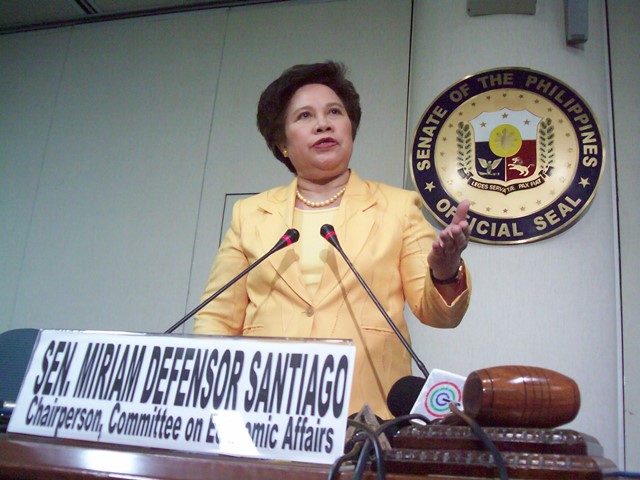Santiago’s Health: A Political and Public Issue

CMFR File Photo
UNLIKE HER four rivals for the presidency, Senator Miriam Defensor Santiago has generated considerably less steam. Having held only four campaign rallies with her running mate and having missed one Comelec-organized presidential debate, the three-time presidential contender has also done poorly in the surveys. But despite her minimal public appearances, Santiago is still a steady source of sound byte and quotable quotes for the media, her “pick-up lines” often included in reports on her campaign. The senator’s quips appeal mostly to the youth, who in campus surveys and mock polls often name her as their preferred president.
Santiago’s health has, on and off, been the subject of media reports. In July 2014, Santiago revealed that she had Stage 4 lung cancer. But she declared a month later that she was open to running for president should she be fully healed by the end of the year. In October 2014, Santiago said that 90 percent of her cancer cells had regressed after treatment but formally asked to be excused from carrying out her Senate duties, such as attending plenary sessions.
Claiming that she has “licked” cancer, Senator Santiago filed her certificate of candidacy on October 16, 2015. A Rappler article by physician and columnist Sylvia Estrada Claudio requested the senator to release her medical records to prove she has been cured. Santiago refused, arguing that it is a violation of human rights to compel her to release her medical records. She also said there is no law requiring presidential candidates to show documentary proof of their health condition, and that based on the Civil Code and Revised Penal Code, to do so would violate her right to privacy.
As provided for in the Constitution, the requirement to disclose medical records only applies to the President — not to presidential candidates — and only in cases of serious illness. In addition, the Omnibus Election Code says that certificates of candidacy can be canceled only when a candidate 1) has no bona fide intention to run for office, 2) intends to make a mockery of the election process and 3) would confuse the voting public because of the similarity of his or her name with that of other registered candidates.
Nevertheless, because Santiago is running for the country’s highest post, the public’s being informed on the state of her health is not simply a matter of law. In this particular issue, the voting public’s right to know should outweigh Santiago’s claim to privacy.
Public interest requires that journalists ask tough questions of an equally tough personality. Being a public official and a staunch supporter of the Freedom of Information bill, the senator’s self- serving interpretation of transparency is something the media could have at least questioned, given the relevance of her health issues to her capacity to serve should she be elected to the country’s highest elective post.
Should she still be running? The answer to this question precisely depends on her actual state of health, given the six-year term of Philippine presidents. After all, the surveys can still be proven wrong on Election Day.
In refusing to disclose her health records, and simply dismissing questions on her health by saying she is well, Senator Santiago has also argued that concern over her health shifts the focus of public discourse from political issues. In reality, the health and other personal concerns of candidates for public office are as much political issues as, say, platforms of government. Santiago’s health is as much a legitimate political issue as Davao City Mayor Rodrigo Duterte’s alleged womanizing, or the citizenship of Senator Grace Poe’s husband and children.
Research on, as well as the distribution and administration of potential cures, treatments and services for many ailments are also affected both by state interventions and corporate interests and are by themselves public issues. Aside from reporting facts and figures about cancer and other ailments, it is equally important for the media to track how the government health sector responds to those suffering from them, and what options are available and accessible to those that need them.
As someone afflicted with cancer, Santiago’s treatment process and cure should, at the very least, also be explained better to avoid confusing those who are undergoing treatment themselves.
Santiago’s health problems thus provide the media the opportunity to look into health both as a political and a policy issue, and it is not too late to do so.





Leave a Reply